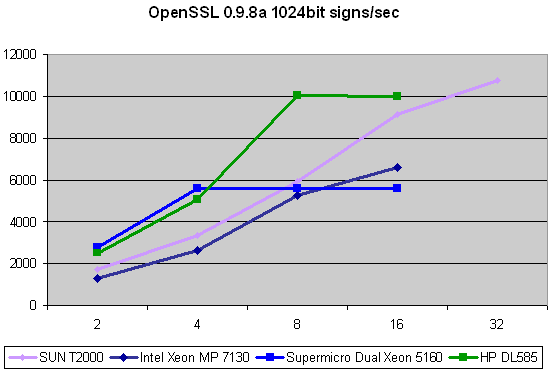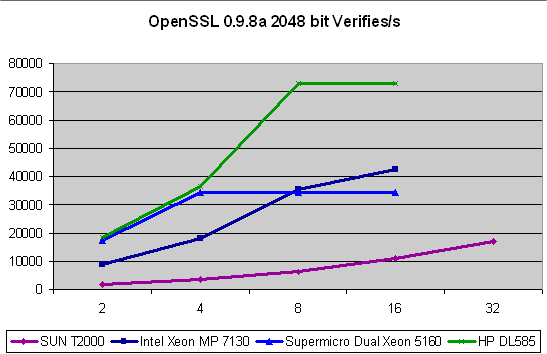Intel's newest Quad Xeon MP versus HP's DL585 Quad Opteron
by Johan De Gelas on November 10, 2006 12:00 PM EST- Posted in
- IT Computing
Secure Socket Layers RSA Performance
Secure web communication is possible through the utilization of the Secure Sockets Layer (SSL). Using "openssl speed rsa" we can measure the number of RSA public keys (sign) operations that a system can perform per second using OpenSSL 0.9.8a. Both verifies/s and signs/s benchmarks are rather synthetic, but give an idea of the "pure" encrypting and decrypting speed.
Note that this time we did not compile OpenSSL with specific flags for each architecture (march="xxx") but we used the same flags on each CPU. We feel that this better reflects the real world use of SSL as most people do not know the specific CPU architecture they are running on. So we compiled with the following on all x86 systems:

Compared to our previous findings, the Opteron 2.4 GHz no longer (slightly) beats the 3 GHz Xeon DP 5160. This is the result of replacing a "compiled specifically for each architecture" binary with a binary that is compiled with the more generic -o3 optimization, which as stated is more realistic. Still, our previous conclusion stands: clock for clock, the Opteron is quite a bit better at this than the Xeon "Core" architecture (Xeon 5160) and a lot better than the Xeon "NetBurst" architecture (Xeon MP 7130). Despite being clocked 20% lower than the Xeon 5160, it is only 9% slower at 4 threads. The 8 MAUs of the Sun T1 still give the 1 GHz Sun the edge when we fire off 32 "SSL RSA Signing" threads.
In the case of doing verifies, the server has to authenticate the identity of the client. This is a lot less intensive, and we show you the verifies/s numbers at 2048 bits. At 1024 bits length, both the Woodcrest and Opteron were able to verify more than 50,000 keys per core, and that is a hard limit of the OpenSSL benchmark.

Again, the Opteron takes the lead. Encrypting or signing will slow down a server much quicker than verifying keys, so this benchmark is of smaller importance than the sign/s benchmark.
Secure web communication is possible through the utilization of the Secure Sockets Layer (SSL). Using "openssl speed rsa" we can measure the number of RSA public keys (sign) operations that a system can perform per second using OpenSSL 0.9.8a. Both verifies/s and signs/s benchmarks are rather synthetic, but give an idea of the "pure" encrypting and decrypting speed.
Note that this time we did not compile OpenSSL with specific flags for each architecture (march="xxx") but we used the same flags on each CPU. We feel that this better reflects the real world use of SSL as most people do not know the specific CPU architecture they are running on. So we compiled with the following on all x86 systems:
gcc -fPIC -DOPENSSL_PIC -DZLIB -DOPENSSL_THREADS -D_REENTRANT -DDSO_DLFCN -DHAVE_DLFCN_H -m64 -DL_ENDIAN -DTERMIO -O3 -Wa,-noexecstack -g -Wall -DMD32_REG_T=int -DMD5_ASM
Compared to our previous findings, the Opteron 2.4 GHz no longer (slightly) beats the 3 GHz Xeon DP 5160. This is the result of replacing a "compiled specifically for each architecture" binary with a binary that is compiled with the more generic -o3 optimization, which as stated is more realistic. Still, our previous conclusion stands: clock for clock, the Opteron is quite a bit better at this than the Xeon "Core" architecture (Xeon 5160) and a lot better than the Xeon "NetBurst" architecture (Xeon MP 7130). Despite being clocked 20% lower than the Xeon 5160, it is only 9% slower at 4 threads. The 8 MAUs of the Sun T1 still give the 1 GHz Sun the edge when we fire off 32 "SSL RSA Signing" threads.
In the case of doing verifies, the server has to authenticate the identity of the client. This is a lot less intensive, and we show you the verifies/s numbers at 2048 bits. At 1024 bits length, both the Woodcrest and Opteron were able to verify more than 50,000 keys per core, and that is a hard limit of the OpenSSL benchmark.

Again, the Opteron takes the lead. Encrypting or signing will slow down a server much quicker than verifying keys, so this benchmark is of smaller importance than the sign/s benchmark.










88 Comments
View All Comments
Niv KA - Saturday, November 11, 2006 - link
I belive Clovertown is going to be announced somethime in the next week or two. On thursday I went to the "Microsoft: Ready for a New Day" here in Belgium (where Bill gates made an appearance of about half an hour, although not related!) and at the Intel booth they were showing off 4 servers which where running an "unannounced platform"! One of the technical guys at the booth let me in on a little "secret"! The Supermicro Systems were running "two sockets each box, each socket 4 cores! Eight cores each box! And the best part is its woodcrest arch!". I asked him if it was clovertown and he sayed that he "is just a technical assistant, not alowed to say anything" but he made the answer clear on his face! Clovertown is ready to go, and its FAST! They were running benchmarks all the time! I will post pictures on the fourms if I have enough time, but I have a HUGE project I need to hand in by tuesday so I might forget!
---Niv K Aharonovich
PS: About the "outdated" system comments above, I am fully on Anandtechs side, it is impossible for an online newspaper company to make enough money to BUY everything, esp. in the $15,000 area! The only way is to ask for it from the vendors, and the vendors decide what to provide! Good job anandtech and continue the good work!!!!!!!
Dennis Travis - Saturday, November 11, 2006 - link
Great job as usuall. Keep up the excellent work.AnandThenMan - Friday, November 10, 2006 - link
Another bullshit "comparison" nice job guys. You are comparing an AMD system that has been out for over 2 years. Useless review as usual. Why are you not comparing new with new? Why don't you use a Xeon box that was out 2 years ago?Anandtech's reviews have become more and more worthless.
JohanAnandtech - Saturday, November 11, 2006 - link
1. AMD has confirmed that they feel the HP DL585 with 4x 880 is a worthy competitor for our Tulsa machine.2. This server is 5 months old, not 2 years. As I made clear in the article, this is the 2006 revision.
As we invest a lot of time of effort to convince OEMs and others to send us extremely expensive hardware for review, spend weeks tweaking benchmarks and OS to give you benchmarks, we hope we may expect some useful feedback from our readers.
Just writing "useless" with little or no explanation why you feel it is worthless is not helping anyone.
AnandThenMan - Sunday, November 12, 2006 - link
I was going to post an explanation as to why the "review" is very poorly done. But Scientia over at AMDz did a far better explanation then I could come up with.http://www.amdzone.com/index.php?name=PNphpBB2&...">http://www.amdzone.com/index.php?name=PNphpBB2&...
Either the review is intentionally authored to show Intel in as best light as possible, or the author is incompetent and should not be doing reviews at all. I stand by what I originally posted, the review is bullshit.
primer - Saturday, November 11, 2006 - link
Agreed.goldfish2 - Friday, November 10, 2006 - link
Can I just quickly mention how nice it is to read an article where the author has managed to present all the relevant informatiom in as concise a manner as is possible, good job.JohanAnandtech - Saturday, November 11, 2006 - link
Thanks!Server reviews are extremely time consuming so most publications are not interested in it, so I am glad AT allows me to do this kind of reviews.
AllYourBaseAreBelong2Us - Friday, November 10, 2006 - link
Can you guys get a new DL585 G2 and do benchmarks with this new model instead?Viditor - Friday, November 10, 2006 - link
I thought this too...the G2 has 7 PCIe slots (3 x8, 4 x4), is $800 less expensive, and offers newer SCSI controllers.